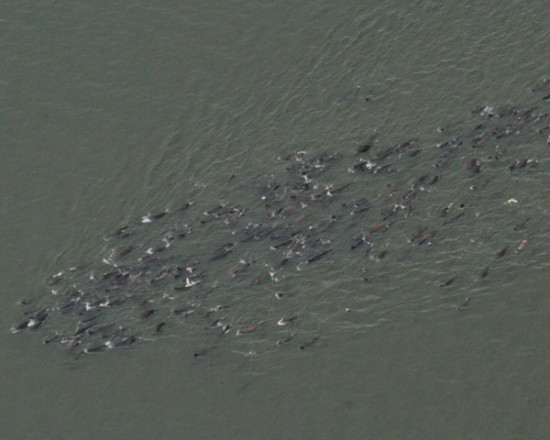
Columbia Sea Lion Bill Passed By US Senate
The U.S. Senate has passed a key bill that would make it easier for state and tribal managers to protect ESA-listed salmon and steelhead in the Lower Columbia from California sea lions.

“What a day!” said an almost-speechless Liz Hamilton of the Northwest Sportfishing Industry Association this afternoon. “Maybe we’ll be able to stave off some extinctions.”
S.3119, known as the Endangered Salmon and Fisheries Predation Act, does need to be reconciled with a nearly identical version that was passed by the US House and be signed into law before the end of the year by President Trump, but it’s good news for fish and fishermen who’ve watched helplessly as sea lions have chowed down on Chinook, coho, steelhead and other stocks.
It amends the Marine Mammal Protection Act for five years to allow for the lethal removal of California sea lions in the Columbia downstream of Bonneville Dam and upstream to McNary Dam, as well as in the river’s tributaries with ESA-listed salmonids.
“It’s such an important piece of legislation,” said Hamilton. “So little gets done, especially for fish.”
A Northwest Power and Conservation Council report from late last month said that NOAA researchers found sea lions ate from 11 to 43 percent of spring Chinook that entered the Columbia annually since 2010, with 2014’s run hit particularly hard — an estimated 104,333 ESA-listed Upper Columbia springers “were lost between Astoria and the dam to the unexplained mortality, which the chief researcher, Dr. Michelle Wargo-Rub, said can be attributed to sea lions.”
The states of Washington, Oregon and Idaho have had federal permission to remove specific animals gathered at Bonneville Dam since March 2008. This bill extends that authority to the Yakama, Nez Perce, Umatilla and Warm Springs Tribes and the Columbia River Inter-Tribal Fish Commission.
Today’s move also follows on federal fishery overseers’ recent move to allow ODFW to remove sea lions at Willamette Falls, where if nothing had been done, the state estimated that at least one run of wild winter steelhead had a 90 percent chance of going extinct.
Earlier this year, NMFS found that California sea lions had reached their habitat’s carrying capacity. Almost all if not all that visit the Northwest to snack on salmonids are males.
Hamilton credited a “a coalition like no other” for the heavy lift.
In Congress, that came from a bipartisan group of Northwest lawmakers — Senators Maria Cantwell (D-WA) and Jim Risch (R-ID) to get the bill through the upper chamber after Washington Rep. Jaime Herrera Beutler (R-3) and Oregon Rep. Kurt Schrader (D-5) sponsored one in the House.
“We greatly appreciate the bipartisan efforts of Senators Cantwell and Risch to secure Senate passage of this critical legislation,” said Gary Loomis, founder of G-Loomis, Edge Rods, and Coastal Conservation Association in the Pacific Northwest, in a press release. “Current law is failing wild and endangered Columbia River basin salmon and steelhead populations, some of which face an imminent risk of extinction if nothing is done to address the unnatural levels of sea lion predation and restore balance to this unique Ecosystem. Every member of the U.S. House of Representatives – Republican and Democrat – from Oregon, Washington, and Idaho voted for similar legislation this summer and the six U.S. Senators from these states came together to pass this critical legislation to protect our salmon.”
According to CCA’s Tyler Comeau, the bill was passed by “unanimous consent,” expediting its passage through the Senate for lack of objections. He said his organization believes it will become law.
Even as Hamilton shed “tears of joy,” she was quick to point out the efforts of staffers at state fish and wildlife agencies — Meagan West at WDFW and Dr. Shaun Clements at ODFW.
“It was the scientists, Dr. Shaun Clements, that kept the conservation front and center,” said Hamilton.
We have reached out to WDFW and the Columbia River Inter-Tribal Fish Commission for comment and will fold those in when they arrive, but for his part, Clements said ODFW was “very relieved to have achieved this major milestone thanks to the support of the Northwest Senate delegation.”
“Passing this legislation to amend the MMPA is critical to ensuring we don’t have another repeat of Ballard Locks, which saw the extirpation of a wild steelhead run as a result of predation by a handful of sea lions,” Clements said, in reference to Herschel et al’s 1980s’ feeding frenzy on Lake Washington watershed-bound winter-runs.
“Removing sea lions is not something we take lightly,” he added, “but it is unfortunately necessary as we are seeing some salmon, steelhead, and potentially sturgeon populations in the Columbia being pushed to the point of no return. We very much appreciate the efforts of the entire delegation, and particularly Senators Risch and Cantwell for recognizing the urgency and passing a bill that will allow both fish and sea lions to thrive.”
Hamilton also noted the importance of the diversity of the conservation community that came together, members such as the Wild Salmon Center.
“I’m convinced it made a lot of difference,” she said.
Sea lions aren’t nearly the only problem impacting returns of ESA-listed salmon and steelhead, Hamilton acknowledged, but this is good news for the fish that live in or return to the region’s most important river.
But there’s also work to be done elsewhere in the region. WDFW staffers are expected to brief the Fish and Wildlife Commission late next week on the impact sea lions as well as harbor seals are having in other Washington waters. Frustrations are boiling over and Puget Sound where more than 10 sea lions have been illegally shot and killed this fall.
